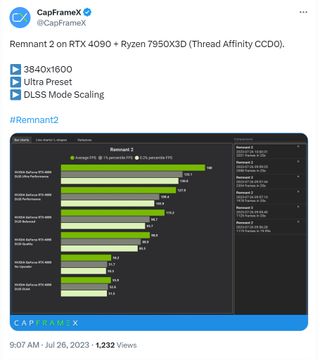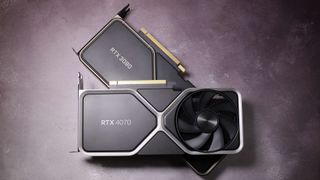Remnant 2's upscaling settings are more necessity than nicety and players aren't happy about it
The game's developers have confirmed they "designed the game with upscaling in mind."

Gunfire Games, the developer of Remnant 2, has announced it designed the game around the specific use of upscaling technology, and some players aren't too happy about it.
Upscaling technologies such as DLSS, XeSS, and FSR are useful tools for pushing frame rates higher on hardware that otherwise shouldn't be able to do so. I'd wager to say most gamers see these technologies today as an optional way to boost your frame rates above and beyond the baseline frame rate your PC can deliver at native resolutions. However, the way in which Remnant 2 is going about things is by using upscaling as a fundamental part of the performance picture.
In other words, in Remnant 2, upscaling is used in making up that baseline performance, not to boost it.
We know this from comments made by the developer on a Reddit thread titled: Technical Information and Troubleshooting (spotted by WCCFTech).
"We've heard from a few folks about the game's overall performance. We're definitely going to roll out performance updates after the game's launch. But for the sake of transparency, we designed the game with upscaling in mind (DLSS/FSR/XeSS). So, if you leave the Upscaling settings as they are (you can hit 'reset defaults' to get them back to normal), you should have the smoothest gameplay."
Some players have made it clear on Reddit, Twitter (sorry, X), and in Steam reviews they don't like this decision. They argue a game should run smoothly and perform well prior to the use of upscaling technology, and that upscaling should then be used as an additional measure, should the player wish, to boost frame rates—usually at minor to small expense to visual quality.

As noted by CapFrameX in their testing of the game, even the ungodly combo of an RTX 4090 and Ryzen 9 7950X3D was unable to hit 60fps on average at max settings (3840 x 1600) without upscaling. That's not even full 4K, by the way.
The biggest gaming news, reviews and hardware deals
Keep up to date with the most important stories and the best deals, as picked by the PC Gamer team.

With DLSS enabled in Ultra Performance mode that same machine managed to hit 160fps on average. It's a striking difference for a very, very expensive graphics card and CPU.
The issue isn't that anyone's necessarily going to be left out in the cold. The game supports DLSS, XeSS, and FSR—the big three—and while DLSS is an RTX-only technology, XeSS and FSR are both hardware agnostic and capable of running on all sorts of cards.
That said, these upscalers' proficiency is diminished on much older or entry-level cards. The way these technologies work is they still require some amount of speed to deal with upscaling, and if your card is running absolutely max speed to spit out 15fps, you don't usually have enough horsepower leftover.
But the bigger issue here is the way this is being perceived as the beginning of a negative trend for PC gaming.

Best CPU for gaming: The top chips from Intel and AMD.
Best gaming motherboard: The right boards.
Best graphics card: Your perfect pixel-pusher awaits.
Best SSD for gaming: Get into the game ahead of the rest.
Upscaling is a crowning achievement for all involved: it represents (mostly) free performance, doesn't cost a penny, and huge swathes of PC gamers can utilise it on their machines. It's really a big deal for gaming, has negated a lot of the performance penalties of graphical techniques such as ray tracing, and is only set to become even more impressive. The thing is, if it becomes an accepted part of the baseline performance, it no longer acts as that performance boost players feel it to be.
Then there's the threat that upscaling becomes a way to cut corners for optimisation. That's already a sore subject due to the state of many PC games at release as of late. Looking back at some of those game releases, it's safe to say that there have been a few that essentially used upscaling as a crutch for performance prior to Remnant 2, especially at more demanding settings, but we've never had a developer come out and say it so plainly, which is why I think Remnant 2's devs are taking the brunt of backlash.
We've already begun to see upscaling technologies as a keystone of a game's settings menu, and with that sort of ubiquity there are going to be examples of games that run poorly without some form of upscaling enabled. Whether that's how every game will function in the future, I don't believe Remnant 2 alone is setting this precedent, but I'm also hoping that it doesn't become the inevitable future of PC gaming.

Jacob earned his first byline writing for his own tech blog. From there, he graduated to professionally breaking things as hardware writer at PCGamesN, and would go on to run the team as hardware editor. He joined PC Gamer's top staff as senior hardware editor before becoming managing editor of the hardware team, and you'll now find him reporting on the latest developments in the technology and gaming industries and testing the newest PC components.
Most Popular






